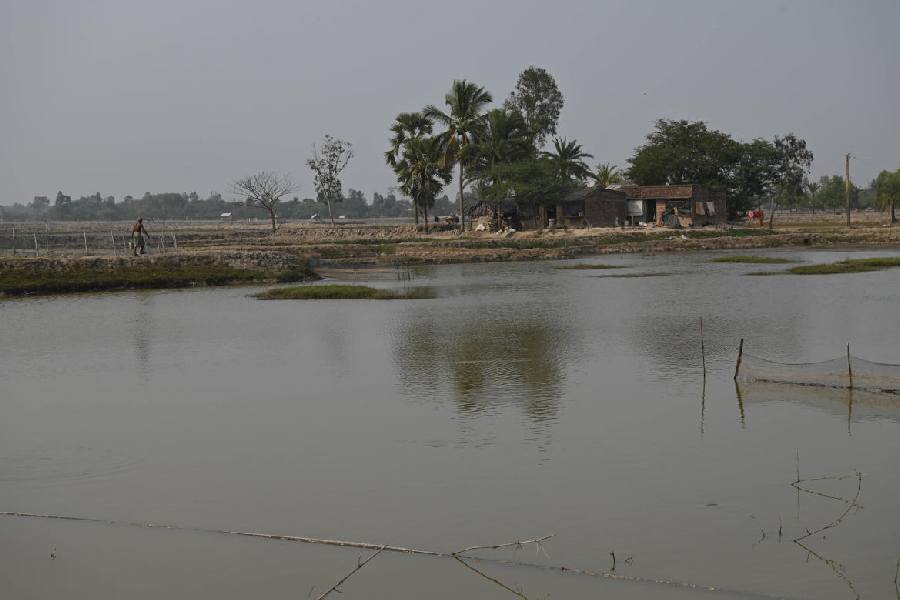The Bengal government has decided to set up cooperatives for the landowners whose plots were forcibly converted into bheris (shallow fish ponds) allegedly by Trinamul Congress leaders in Sandeshkhali and impart them training on pisciculture to offer them alternative livelihood options.
Sources in the state administration said the idea was mooted after it was found that the fertility of the soil in land parcels had declined because of saline water.
“In terms of livelihood, it makes sense if the farmers switch to pisciculture as fisheries have come up on large tracts of land.... We will offer training to the landowners, whose plots were forcibly taken over and converted into bheris. The government will provide all assistance to the landowners if they agree to switch to pisciculture," said a senior official aware of the development.
Sources in the North 24-Parganas district administration said one bheri — spread over about 120 acres of land, belonging to 80-odd families — had already been identified to launch the process.
“So far, it has been found that land parcels of 80-odd people were grabbed and saline water was pumped into this large tract of land to create a bheri. It is our responsibility to reclaim the land parcels and return those to the original owners. But agriculture is a bad idea on these plots as fertility has declined because of salinity,” said a senior government official.
Sources said if it was found that more bheris had been set up by taking over plots of other landowners forcefully, the government would try to form cooperatives for those landowners, too, and would urge them to run the fisheries.
Officials are laying stress on running the bheris, instead of converting the plots into agricultural land, as it will not be a feasible idea since the salinity of the plots is not going to wash away easily.
A team of 12 officials from the offices of the district land and land reforms officer and the block land and land reforms officer are carrying out inspections in the area based on the complaints lodged with the administration so far. As of now, only one such bheri has been identified, but it appears that some more bheris will be identified soon, said a source.
“If a land parcel remains under saline water for five-six years, the fertility of the plot gets affected severely and the majority of the crops cannot be grown on the land. It takes several monsoons to get the salinity washed away. So, it would not be helpful for the landowners to get back the plots and cultivate them immediately,” said a source.
Officials in the districts said that they were yet to contact the land owners after the verification of all the land parcels was completed.
“We will first prepare a detailed plan and then contact the land owners. We would try to convince them that this would be the best way to earn livelihood in a situation like this,” said an official.
Officials are hopeful of convincing the villagers as they bank on a new scheme announced in the state budget for the fishermen.
“If the landowners agree to the proposal, they can get Rs 5,000 each in May and June, the non-fishing season. This scheme was announced in the state budget for three coastal districts, including North 24-Parganas. Moreover, the state will help them in all possible ways to run the bheris,” explained an official.
The plan to convince the landowners to switch to pisciculture may seem logical on paper, but, multiple sources said, implementing it would be easier said than done.
Prabhas Das, a farmer, whose 2.5 bigha of land was grabbed and converted into a bheri by arrested Trinamul leader Shibaprasad Hazra, told this newspaper that he wanted to cultivate his ancestral property, instead of switching to pisciculture.
"We want to get our farmland back. We are farmers and we don't want to be fishermen. We would request the government to return the land to a cultivable situation,” said Das.
"We live on an island, surrounded by three rivers which are a source of fish. Then why would we go for pisciculture? Let them get our land back and give us the liberty to do whatever we want to do there," said Pulak, son of Prabhas, who is a graduate and a Toto driver by profession.
Another farmer, who did not wish to be identified, said lack of experience in pisciculture was the main reason behind his reservation with the government plan.
"We have been farmers for generations. Now starting pisciculture would be challenging for us," said another farmer in Sandeshkhali.
Agriculture experts also think that while some varieties of paddy can grow in saline water, it would be prudent for the farmers to choose pisciculture over cultivation for better profit.
"Yes, it would take a few years to make a land parcel free from saline water. Meanwhile, the farmers can produce paddy by choosing different varieties of crops which grow in saline water," said Swapan Kumar Datta, the former deputy director general (crop science) at the Indian Council For Agricultural Research (ICAR).
"But, in the case of Sandeshkhali, the farmers may choose pisciculture over paddy cultivation to make a better profit. However, the choice is absolutely the decision of the landowners," added Datta who served as vice-chancellor in Visva-Bharati and Biswa Bangla Biswabid.











